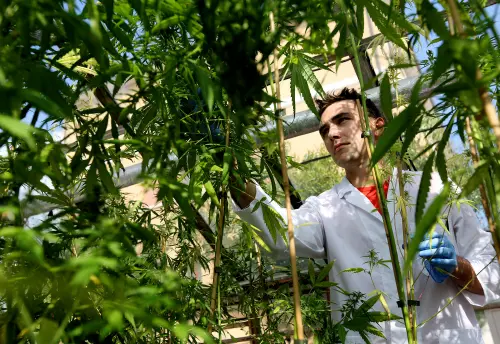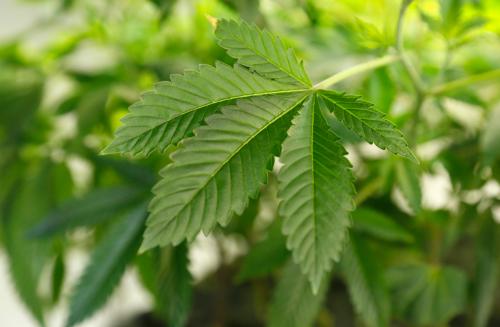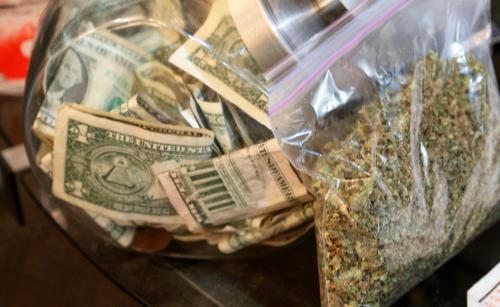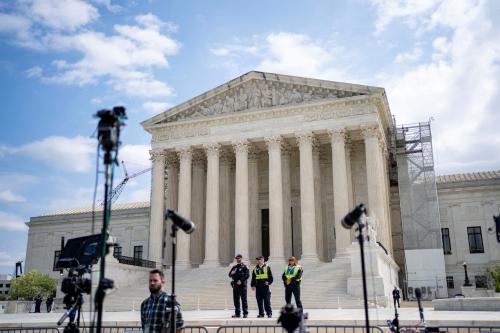This week marijuana reform advocates applauded a federal appeals court decision limiting the power of the Department of Justice to prosecute certain marijuana growers. In United States v. McIntosh, the three judge panel (two Republican and one Democratic appointee) dealt explicitly with the Rohrabacher amendment—a rider to a congressional spending bill that barred the DOJ from spending funds on enforcing the Controlled Substances Act in states with medical marijuana reform laws.
Despite the rider being signed into law—by President Obama—the Obama administration continued to bust growers in medical marijuana states. The defendants in the 10 cases grouped together in this appeal hail from California and Washington and were indicted on a variety of federal charges. They fought the charges in lower courts on the basis of the rider without success, and brought their case to the 9th Circuit Court of Appeals.
After the usual judicial hoops of establishing jurisdiction and the appropriateness of the court stepping in at this time to intervene in an ongoing prosecution, the court ruled on the merits of the case. The 9th circuit decision explains that even though “the rider is not a model or clarity” (24) it “prohibits DOJ from spending funds from relevant appropriations acts for the prosecution of individuals who engaged in conduct permitted by the State Medical Marijuana Laws and who fully complied with such laws” (27).
If you’re a marijuana reform advocate, a grower, a cannabis enterprise executive, a patient, or otherwise related to the medical marijuana industry, this is great news, right?
Well, yes and no. The cork popping over the ruling in McIntosh may have been a bit premature. While the central holding of the case is a tremendous victory for the movement and offers a real barrier against executive enforcement power in the context of marijuana, the details of the decision are a bit more mixed. Namely, for the medical marijuana community, there are 10 things to hate about the McIntosh decision.
1. The ruling has limited scope
The U.S. appellate court system is broken up into 13 circuits, each of which has jurisdiction over cases emerging from specific geographic regions (or issues in the case of the Federal Circuit). The ten cases consolidated under McIntosh came from California and Washington, thus giving the 9th Circuit Court of Appeals jurisdiction to hear that case. Its ruling, of course, also only applies to the geographic area covered by the 9th Circuit: Alaska, Arizona, California, Hawaii, Idaho, Montana, Nevada, Oregon, Washington, Guam, and the Northern Marianas Islands. That’s a big space with a lot of Americans. However, the holding in McIntosh does not apply in the numerous other states with medical marijuana laws located outside of the 9th Circuit. Might another appeals court look to McIntosh for guidance? Sure. But that is not absolute and circuit splitting—different appeals courts ruling on similar or identical issues and coming to opposite conclusions—is common. So, if you’re a homegrower in Colorado or a dispensary in Massachusetts, this ruling doesn’t necessarily cover you.
2. McIntosh is about medical marijuana only
This ruling has an additional limitation in that it does not cover the recreational markets in Alaska, Washington, and Oregon. Nor would a similar ruling from the 10th Circuit cover Colorado’s recreational market. The court in McIntosh took great pains to rule according to the plain meaning of the text of the Rohrabacher Amendment. The legislative language is clear that it applies only to medical marijuana and nothing else. In fact, the court is explicit on this point:
“We recognize that some members of Congress may have desired a more expansive construction of the rider, while others may have preferred a more limited interpretation. However, we must consider only the text of the rider” (31).
3. The Cole Memos are not the Great Savior many believe
Yes, the Cole Memos, particularly the second one, have allowed the medical and recreational marijuana industries to breathe a sigh of relief. However, McIntosh shows that they are limited in nature and effectively provide no firm and particularly no permanent solution for the industry. The court never mentions the memos explicitly. That comes in large part because they are not relevant to the case, only the Rohrabacher Amendment is. But, after the court goes to great length to explain that marijuana production remains a prosecutable crime, it offers two more important notes that expose the danger of believing the Cole Memos to be a get-out-of-jail-free card. The court notes that such prosecutions could happen (if DOJ wanted) because “Congress could appropriate funds for such prosecutions tomorrow” (32). Those words are critical in signaling that if DOJ wants to prosecute, the only thing formally stopping them is a lack of funds—not the Cole Memos. The court goes on to hint that DOJ’s enforcement discretion under the Cole Memos is not permanent either. In a footnote the court explains “a new president will be elected soon, and a new administration could shift enforcement priorities to place greater emphasis on prosecuting marijuana offenses” (33). Translation: the Cole Memos may not be here to stay.
4. State-level marijuana reforms do not legalize marijuana
The court takes a firm stance in detailing that marijuana is not legal in any state that passes reform laws or initiatives for medical or recreational programs.
“Nor does any state law “legalize” possession, distribution, or manufacture of marijuana. Under the Supremacy Clause of the Constitution, state laws cannot permit what federal law prohibits U.S. Const. art VI, cl. 2. Thus, while the CSA remains in effect, states cannot actually authorize the manufacture, distribution, or possession of marijuana. Such activity remains prohibited by federal law” (33).
5. The Rohrabacher Amendment offers no immunity
Beyond showing the limits of what states can do vis-à-vis federal power, the court also notes how limited even the Rohrabacher Amendment is for the individual.
“To be clear, [the Rohrabacher Amendment] does not provide immunity from prosecution for federal marijuana offenses…Anyone in any state who possesses, distributes, or manufactures marijuana for medical or recreational purposes (or attempts or conspires to do so) is committing a federal crime” (32).
Here the court reiterates that the only reason people may not be prosecuted is that DOJ is not authorized to spend money on such prosecutions. The restraint is not a state-level reform, nor is it even the Cole Memo.
6. This ruling may not always help current defendants or marijuana law violators
The court may have granted a reprieve from prosecution for these defendants or for others operating in medical marijuana states in the 9th circuit, but that reprieve is temporary. The court notes that people operating in medical marijuana states and complying with state laws are still breaking the law and that the statute of limitations gives the government time to prosecute them: “DOJ is currently prohibited from spending funds from specific appropriations acts for prosecutions of those who complied with state law. But Congress could appropriate funds for such prosecutions tomorrow” (32). The court goes on to note:
“The federal government can prosecute such offenses for up to five years after they occur. See 18 U.S.C. § 3282. Congress currently restricts the government from spending certain funds to prosecute certain individuals. But Congress could restore funding tomorrow, a year from now, or four years from now, and the government could then prosecute individuals who committed offenses while the government lacked funding” (32-33).
In effect, if the Rohrabacher Amendment fails to make it into subsequent spending bills, the DOJ can pick up right where it left off in prosecuting any marijuana operator in any state.
7. This ruling may not always help future defendants
The temporary nature of this provision as noted above also means that anyone operating in the future is subject to the same risk. McIntosh may make federal prosecutors back off from actively trying cases in the 9th Circuit, but marijuana-related activities are still active violations of law. If the Rohrabacher Amendment is removed others engaging in such activities pre- and post-McIntosh could be indicted. The current protection stemming from DOJ funding, the court notes could continue into the future because “this temporary lack of funding could become a more permanent lack of funds if Congress continues to include the same rider in future appropriations bills” (32). But, in saying, this the court also signals the importance of this rider for the medical marijuana community, every single year.
8. This ruling may not even protect the current defendants in this case
This case is clear in highlighting what DOJ can and cannot do with prosecutions in medical marijuana states in the 9th Circuit. However, the ruling does not throw out a conviction (none of the prosecutions went to verdict) nor does it absolve the defendants of wrongdoing. These cases are remanded back to the district courts because
“Appellants are entitled to evidentiary hearings to determine whether their conduct was completely authorized by state law, by which we mean that they strictly complied with all relevant conditions imposed by state law…” (32).
In the course of such hearings, if a district court finds that a defendant or group of defendants operated in a manner that violated state marijuana laws, the Rohrabacher Amendment does not apply, and the DOJ can use funds to prosecute them for violation of federal law. Some of these defendants may ultimately avoid charges, but McIntosh gives them no guarantee. And frankly, the spirit of state-level reforms, the Rohrabacher Amendment, and even the Cole Memos would urge prosecutions of those who broke state laws.
9. The prosecutorial processes will drag on with some consequences
It is important to note that while some prosecutors may simply drop chargers in the wake of McIntosh others may proceed to evidentiary hearings about defendants’ possible violations of state laws. In the process, an already long judicial process grows longer. For those violating state laws, they will surely (and rightly) find themselves facing federal penalties. For those found to be acting in concert with state laws, the emotional and financial costs will mount. Any plants seized during the arrests will (and surely already have been) compromised and are not salvageable. Reputational costs around such prosecutions or attempted prosecutions can have enduring effects. While McIntosh may allow some defendants to avoid federal prison time, fines, and a criminal record, the effects of a prosecutorial effort has consequences beyond a verdict.
10.The basis of the ruling may be controversial in nature
The rationale the court uses in McIntosh involves an interpretation of the text of the Rohrabacher Amendment. As noted above, the court was explicit that it wished that Congress offered more explicit language. Yet, the court proceeded to interpretation. The language does not say that DOJ cannot prosecute individuals in medical marijuana states. Instead, it barred DOJ from use funds in medical marijuana states to “prevent any of them from implementing their own laws that authorize the use, distribution, possession or cultivation of medical marijuana.” In a very direct way, the DOJ prosecution does not do anything to the state. It simply prosecutes individuals—in these cases growers—without blocking the state from its own activities. In fact, that was the government’s precise claim. The court stated it was “not persuaded” by the government’s claim that “it does not prevent the Medical Marijuana States from giving practical effect to their medical marijuana laws by prosecuting private individuals, rather than taking legal action against the state” (25).
The court decided that a state cannot implement its laws if people are being prosecuted for activities permitted under those laws.
“By officially permitting certain conduct, state law provides for non-prosecution of individuals who engage in such conduct. If the federal government prosecutes such individuals, it has prevented the state from giving practical effect to its law providing for non-prosecution of individuals who engage in the permitted conduct” (27).
This interpretation of governmental power is sensible. However, the court uses its own logic and dictionary definitions of textual meaning to come to such a conclusion. It does not use case law on that precise point or for the basis of that rationale. It is not to say the court is wrong, and it is surely wading into an area of law in which there is not a significant amount of clear guidance (funding for marijuana prosecutions) even if related case law could provide some help. However, another court at another time in another setting could use its own logic that brings it to a very different conclusion.
That different outcome could be a positive or a negative for the medical marijuana community. If a different appeals court hears a similar case and rules differently, that circuit-splitting will increase the odds that the Supreme Court will hear the case. However, if McIntosh is appealed and it is the Supreme Court that finds a different logic as a basis for a very different conclusion, McIntosh may devastate the marijuana advocacy movement.
Editor’s note: Mohit Mookim and Christine Stenglein contributed to this post.





Commentary
McIntosh decision limits DOJ powers, but medical marijuana advocates should worry
August 19, 2016